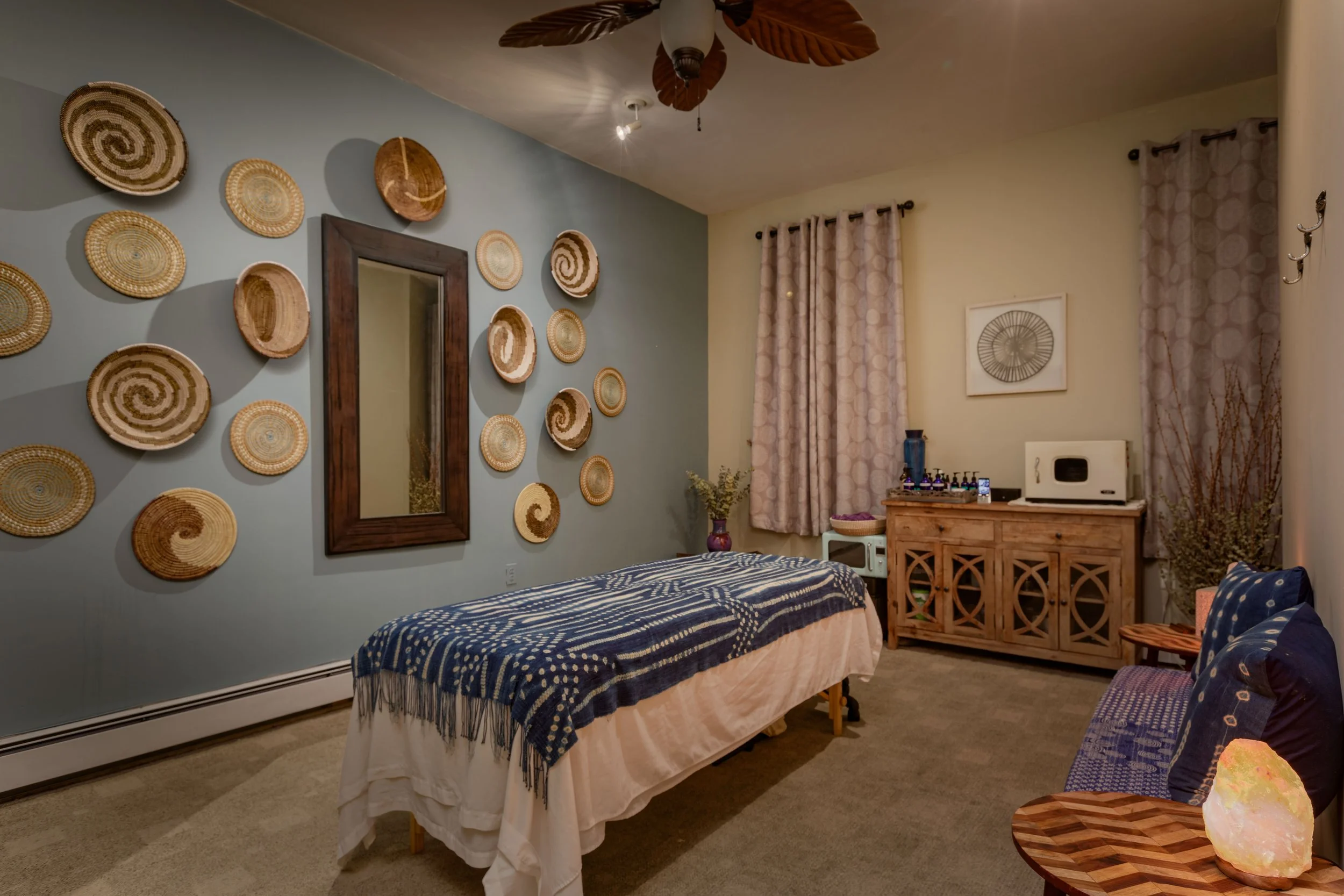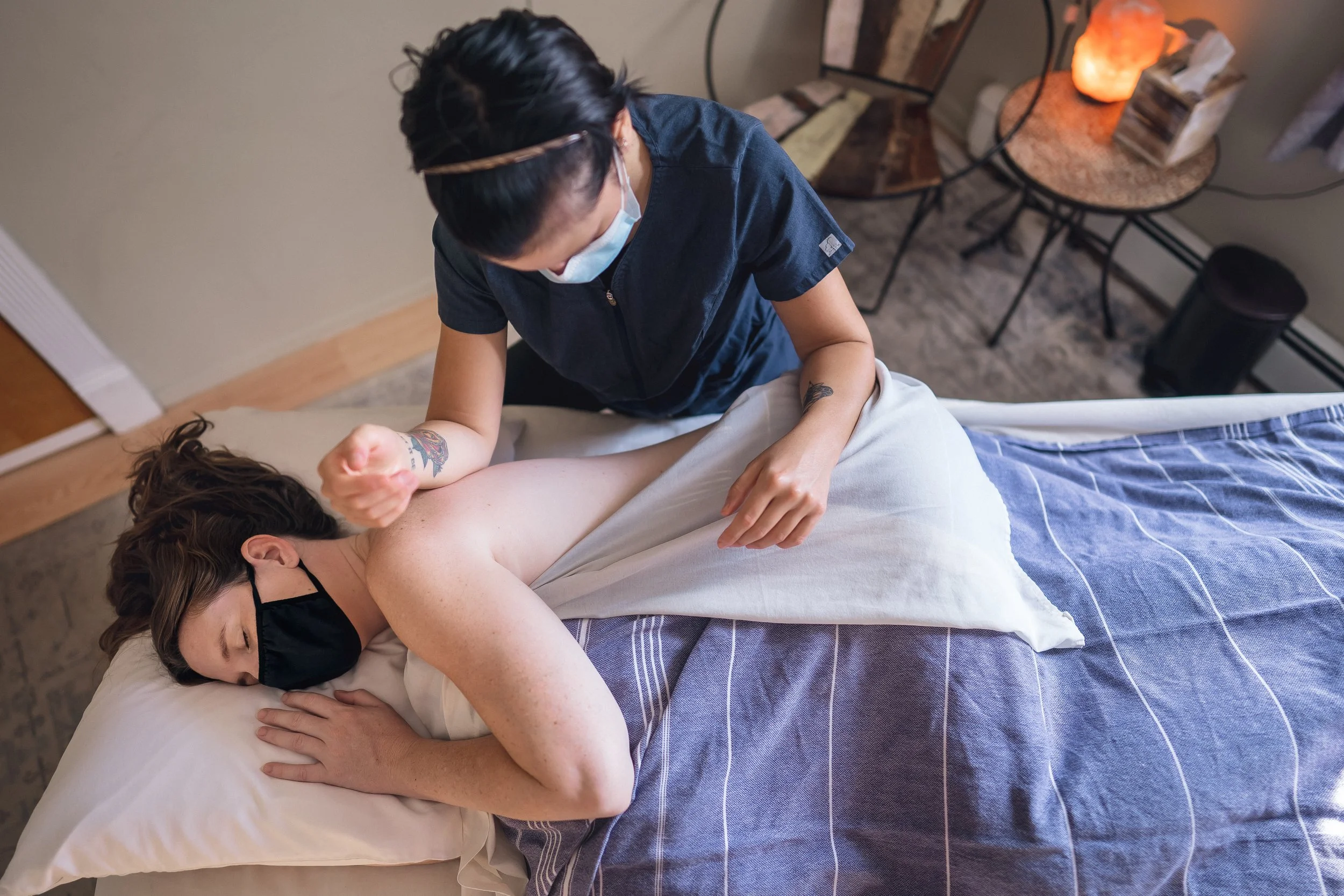What is Prenatal Massage? An Interview with Red Moon Wellness
What is a prenatal massage and how is it specific to the wellness of pregnant people? As a birth worker and former massage therapist, this was a conversation I had quite often. I am a big believer in the effectiveness of bodywork to support the pregnancy and postpartum journey and enjoy providing evidence-based information, as does my friend and colleague Lena DeGloma. The two of us have known each other for over a decade, beginning back when we were both doulas and massage therapists. Since then we have both become moms and Lena has taken her passions and built Red Moon Wellness, an incredible wellness center right in the heart of Park Slope.
Lena's depth of knowledge in clinical herbalism, lactation counseling, childbirth education, and of course bodywork all lend so much support to the perinatal community here in NYC. I am sure you will be curious to try prenatal or postpartum massage after hearing her talk to us. Be sure to say “hi” from the Baby Caravan team when you make your appointment.
Baby Caravan: Why have you chosen to specialize in prenatal massage and what do you love most about it?
Lena: My training as a massage therapist dovetailed with my training as a birth doula and so it was clear from the beginning that supporting the entire childbearing cycle from preconception to postpartum would be the focus of my work. Attending births as a doula gave me the opportunity to witness how structural imbalances in the body affected clients’ birth outcomes. This motivated me to continue to learn about how massage therapists can help support optimal fetal positioning through helping to relieve restrictions in the soft tissue (especially surrounding the pelvis, sacrum, hips, low back, and abdomen) in order to help clients have smoother, faster, and less painful births, with less need for medical intervention.
Now I have a team of more than 20 licensed massage therapists who I have supported with advanced training in prenatal massage and I love seeing the results our clients have. For example, not long ago I brought a new massage therapist onto our team and spent time training her in massage techniques to help clients with breech babies to turn. Then, the following week her very first client that walked in the door had a breech baby at 34 weeks and was hoping to get the baby to turn. I joined the new LMT in the intake with this client to help assess the baby’s current position and then discussed a plan with the LMT for specifically what to focus on and what direction we would be trying to encourage the baby to turn toward. At the end of the session the client came out and said they were pretty sure they felt the baby turn – this was confirmed later that day at their midwife appointment - baby was head down following the massage! I just love how massage can often lead to incredible palpable results, sometimes even immediately!
Baby Caravan: How is prenatal massage different from standard massage therapy?
Lena: Some people (even massage therapists) mistakenly think of prenatal massage as it’s own “modality” or technique. But this really isn’t true. Prenatal massage can involve a whole variety of different modalities from Swedish massage, to deep tissue, myofascial and trigger point therapy, to acupressure, lymphatic drainage, and so on.
What makes prenatal massage different is simply that the therapist knows how to make particular modifications to positioning and techniques for the safety and comfort of the client. Beyond that, a highly skilled prenatal massage therapist is not just making modifications, but actually using their advanced knowledge of the many changes in anatomy and physiology that happen during pregnancy to alleviate imbalances in the body that may lead to common pregnancy complaints and especially to use this knowledge to help prepare the body for birth.
These common imbalances brought on by a variety of lifestyle factors (sitting all day long for work or a sedentary lifestyle, repetitive motions or over-exercise, footwear choices, stress and anxiety, history of trauma, and more) can impact the fetus’s ability to engage into the pelvis to trigger the onset of labor (leading to delayed onset of labor and increased chances of induction) as well as the fetus’s ability to descend and rotate properly through the pelvis which can lead to prolonged or more painful labor and more likely to end in cesarean birth and other interventions.
So a really excellent prenatal massage therapist can use a variety of massage modalities and techniques to help release soft tissue restrictions in the sacro-iliac joints, the psoas muscle, and more to support a smoother physiologic birth.
Baby Caravan: Are there other ways that prenatal massage is misunderstood?
Lena: There are a lot of myths prenatal massage. The most common myths are: we can’t use deep pressure, we can’t use deep pressure on the lower back, we can’t massage the ankles, and you can’t get massage in the first trimester. None of these are true. We absolutely can and do offer deep tissue massage during pregnancy. There are a small handful of areas that we will not do deep work during pregnancy (the abdomen, obviously, and also the calves and inner legs due to the slightly increased risk of deep vein thrombosis in pregnancy), but otherwise, deep pressure - up to the client’s pain threshold - is perfectly fine (and often much needed!) during pregnancy.
Baby Caravan: Stress relief is important during pregnancy for sure! What are some other benefits that pregnant people may not be aware of?
Lena: Aside from what I already discussed about the critical importance of good alignment and balance in the body to allow the baby to get into an optimal position for labor and birth, massage affects nearly every system in the body! This is because massage isn’t just about the muscles - the primary affects of massage are via its affect on our autonomic nervous system through the vagus nerve and this means that massage has beneficial effects on our digestive system, our cardiovascular system, and even our nervous system and hormonal systems.
During pregnancy blood volume is increased by about 50% and massage can help with increased venous return from the extremities and support lymphatic drainage in order to relieve swelling and edema. For the nervous system, relief of stress is not just about relaxing muscles, but also about helping get the body into the parasympathetic response of the nervous system. The parasympathetic response is critical for labor to begin and progress (oxytocin will only be released with the parasympathetic branch of the nervous system turned on) and is also critical throughout pregnancy because our baby’s nervous system is being molded via epigenetic changes in utero – and if the pregnant parent’s nervous system is in a constant state of stress and anxiety this molds the baby’s nervous system to be primed for an overactive stress response as an adaptive mechanism (preparing the baby for what must be a stressful world it’s parent is living in). Spending more time in the parasympathetic nervous system counteracts this and can therefore have lifelong impact on the baby’s mental health. This chronic stress response also affects blood sugar balance and metabolism in the parent and the baby. For an “intervention” that has almost no risks or negative side effects, massage has an enormous number of benefits!
Baby Caravan: What are some good questions to ask a massage therapist before getting started?
Lena: All of our therapists at Red Moon Wellness are trained in prenatal massage via continuing education classes. However, if you were to get a massage elsewhere it would be important to ask before booking what kind of training the therapist has in prenatal massage. Many schools offer limited or no training in prenatal massage and some therapists are “trained” by a spa they work at which may or may not have given them accurate information.
Some places do not offer massage in the first trimester and this is usually due to lack or training or liability concerns, but it not based on any medical reason. It is also important to ask what positions are being used. Some places will offer massage with a special table or bolster that allows for lying prone (face down), however, this is not the safest or most optimal position during pregnancy and so to me that is usually a red flag for a place that does not have therapists well trained in side-lying techniques.
If you are hoping for a deep tissue massage be sure to ask the therapist if they will do deep tissue during pregnancy. While we certainly offer this at Red Moon, there are many therapists who have the mistaken belief that deep work is unsafe during pregnancy and therefore will only give a very light massage - this can lead to a lot of disappointment for you if you were hoping for deeper pressure.
Baby Caravan: What is special about your approach or about Red Moon?
Lena: We have a highly trained and experienced staff, evidence-based and safe protocols including first trimester massage, deep tissue in pregnancy, safest and most comfortable positions, individualized and customized treatments to relieve a variety of common pregnancy issues, a focus on balancing the alignment in the body to prepare for birth. Beyond that, we also have experience sensitively working with clients who have experienced pregnancy loss, struggling with fertility issues, and also supporting clients post-cesarean. We offer cesarean scar massage postpartum along with a castor oil pack add-on that helps reduce adhesions and supports optimal scar healing.
A limited number of therapists on our staff also offer breast/chest massage during pregnancy and postpartum to help with a number of issues related to lactation, breast/chest tenderness, post-surgery to the breast/chest, and so on. We make all of our oil blends and topical herbal products in-house and they are all safe during pregnancy.
We have a birth prep oil blend that contains castor oil, clary sage and geranium essential oil and also a circulatory stimulating liniment which has a variety of herbs that are helpful for relieving edema, swelling and support venous integrity for varicose veins which we can apply to the legs during massage. Finally, we are an inclusive practice that supports pregnant clients and families across the gender spectrum. Not all pregnant people are women and we support all clients. We also commonly see both partners and support the whole family.
More pregnancy and postpartum resources:
Majka: my FAVORITE lactation support for busy moms



